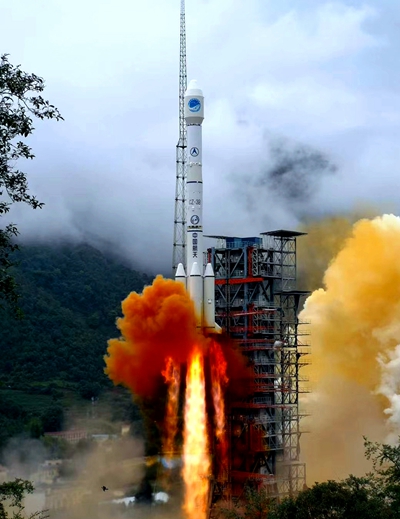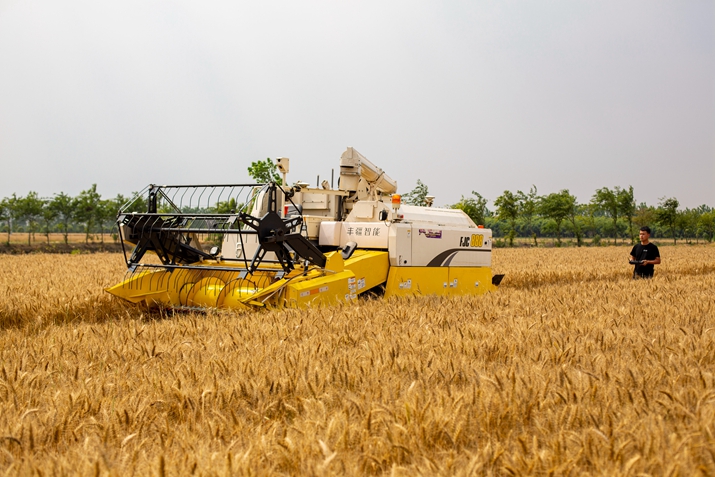|
||||||||||
| Home Nation World Business Opinion Lifestyle ChinAfrica Multimedia Columnists Documents Special Reports |
|
||||||||||
| Home Nation World Business Opinion Lifestyle ChinAfrica Multimedia Columnists Documents Special Reports |
| ChinAfrica |
| The completion of the Beidou satellite navigation network opens up new opportunities for China to serve the world |
| China launches the 55th and final satellite of the Beidou Satellite Navigation System successfully |
| By Li Jing VOL.12 August ·2020-08-03 |

The 55th and final satellite of the Beidou Satellite Navigation System was successfully launched at the Xichang Satellite Launch Center in Sichuan Province on the morning of June 23 (CNSPHOTO)
On the morning of June 23, the world's attention was focused on the Xichang Satellite Launch Center in southwestern China's Sichuan Province. At 9:43 a.m., the 55th and final satellite of the Beidou Satellite Navigation System (BDS) was successfully put into orbit. This launch marked the completion of the so-called Beidou constellation, six months ahead of schedule. Developed independently by China, BDS is now one of the four navigation networks currently active globally, alongside the United States' GPS, Russia's GLONASS and the European Union's Galileo.
"This is a historical milestone. It's a significant step to world's increasing their ability of precise geolocation services through global navigation satellite systems, or GNSS, for people all over the world," said Simonetta Di Pippo, Director of United Nations Office for Outer Space Affairs, following the successful final launch.
As a matter of fact, BDS is already part of people's daily lives, both in China and abroad. According to Wang Zhaoyao, Chairman of the Chinese Satellite Navigation Committee, the Beidou system is being used in various fields such as transportation, agriculture, surveying, mapping, disaster prevention and mitigation, among others. In 2019, the total value of output of China’s satellite navigation and positioning services industry reached 345 billion yuan ($49.4 billion). More than 80 percent of this value came from the Beidou system, added Wang.
The Beidou system has played an important role in the nation's fight against the COVID-19 epidemic. During the construction of the Huoshenshan Hospital and the Leishenshan Hospital in Wuhan early this year, high-precision positioning equipment based on BDS was installed to conduct most site measurements, saving valuable time and making possible the rapid construction of both hospitals. Unmanned aerial vehicles and unmanned delivery vehicles using BDS were mobilized as well to distribute medical supplies in the areas impacted by the epidemic, reducing direct contact between people. The Beidou-based public monitoring and service platform for transport vehicles provided information related to the epidemic, the delivery of epidemic prevention materials and road transport services to more than 6.5 million key transport vehicles in the network, thus ensuring the proper flow of emergency relief supplies.
"The Beidou system has fully participated in the fight against the epidemic by integrating Big Data, the Internet of Things and other advanced technologies to better serve national economic development and people's daily lives," said Yang Changfeng, Chief Designer of BDS. He also said that 70 percent of Internet-connected smartphones in China has benefited from the Beidou's services, which helped to make people's lives smarter and more convenient.
Multi-generational efforts
The successful completion of BDS was made possible by the efforts of generations of Chinese scientists over many decades. Hundreds of thousands of scientists, engineers and technicians from research institutes, universities and companies across the country have played their part in the development of the system.
At the end of the 20th century, China began exploring the development of a satellite navigation system suited to its national conditions, and gradually implemented a three-stage development strategy. At the end of 2000, the Beidou-1 system was completed and began its services in China. At the end of 2012, the Beidou-2 system was put in place to provide services around the Asia-Pacific region. The third stage involved the development of the Beidou-3 system in 2020, leading to the establishment of a global network to serve the whole world.
According to Wang, China has carried out 44 launches over the past 20 years, putting four Beidou test satellites and 55 networking satellites into orbit, thus completing its global network to offer a "Chinese solution" to global satellite navigation, he said.

A technician supervises the testing of an unmanned harvester equipped with the Beidou system in an agricultural park in Hai'an, Jiangsu Province, on May 28 (CNSPHOTO)
Serving the world
"Space is so vast that we will never finish exploring it. The successful launch of the Beidou-3 system's latest global networking satellite does not mean the end of the system's construction, but the starting point for serving the world," Wang said.
He said that China has always put in practice the principle of independent, open, compatible and progressive development, sharing the achievements of BDS with the world. The Beidou system is both an enhancement and an improvement of the existing global satellite navigation system, and offers countries more choices and guarantees. China will continue to work with other satellite navigation systems by increasing compatibility and interoperability, with an aim to provide jointly more stable and reliable services to global users, he added.
In 2018, the first overseas center of BDS was established in Tunisia. Static and dynamic tests have also been conducted in Tunisia, Egypt, Sudan and some other African countries.
To date, the Beidou system has been used in more than half of the countries and regions of the world. Solutions based on BDS for land demarcation, precision agriculture, intelligent construction, vehicle and ship monitoring, and intelligent ports have been successfully applied in regions such as the member states of the Association of Southeast Asian Nations, South Asia, Eastern Europe, West Asia and Africa. Until now, 137 countries have signed cooperation agreements with China on the use of BDS.
According to Yang, China plans to build a more ubiquitous, integrated and intelligent PNT (positioning, navigation and time reference) system based on BDS by 2035, so as to provide more services to the global community.
Comments to lijing@chinafrica.cn
|
||
| About Us | Contact Us | Advertise with Us | Subscribe |
| Copyright Beijing Review All rights reserved 京ICP备08005356号-5 京公网安备110102005860号 |